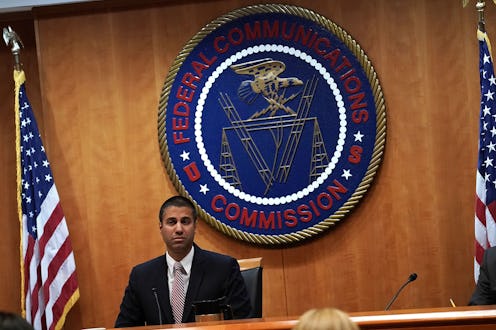News
These Are The States That Are Going To Sue To Save Net Neutrality

After the Federal Communications Commission voted to repeal Obama-era regulations protecting the open internet on Thursday, attorney generals around the country threatened lawsuits against the net neutrality repeal. Three states so far have officially said that they will sue the FCC, and yours might be among them.
New York, Washington, and California have all officially announced their intention to sue. In the case of New York, Attorney General Eric T. Schneiderman said that he'll be leading a multi-state suit that will be filed "in the coming days," but did not elaborate on which states will be participating. It seems likely, however, that it will include the states who co-signed a letter to the FCC with him this week, urging the commission to delay its net neutrality vote.
In that case, the full list would include 18 states: California, Delaware, Hawaii, Illinois, Iowa, Kentucky, Maine, Mississippi, New York, North Carolina, Oregon, Vermont, Virginia, Washington, Massachusetts, Maryland, Pennsylvania, and Rhode Island. Notably, two of those are swing states (Iowa and Virginia), and two are red states (Kentucky and Mississippi). Net neutrality has wide bipartisan support.
"The FCC’s vote to rip apart net neutrality is a blow to New York consumers, and to everyone who cares about a free and open internet," Schneiderman said in a statement:
The FCC just gave Big Telecom an early Christmas present, by giving internet service providers yet another way to put corporate profits over consumers. Today’s rollback will give ISPs new ways to control what we see, what we do, and what we say online. That’s a threat to the free exchange of ideas that’s made the Internet a valuable asset in our democratic process.
While Schneiderman did not go into too many details about the basis upon which he will sue the FCC, he made it clear that he will be — at least in part — challenging their comments process, which he believes was corrupted. At least 2 million of the 22 million net neutrality comments that were submitted on the FCC's website are believed to have been fake. Many of them were submitted multiple times or by duplicate users, including some who gave themselves dubious names like "The Internet." Some comments were submitted based on identities that were stolen.
The FCC has made it clear that it did not take the submissions into great consideration, anyway: The commission said it would only consider comments that included a "serious" legal argument, which is difficult for people who do not have legal backgrounds. But even though the FCC intended to ignore most comments, it is still obligated to make rule changes with a transparent process, and the fraudulent activity could be seen to have interfered with that.
"Today’s vote ... follows a public comment process that was deeply corrupted, including two million comments that stole the identities of real people," said Schneiderman. "This is a crime under New York law – and the FCC’s decision to go ahead with the vote makes a mockery of government integrity and rewards the very perpetrators who scammed the system to advance their own agenda."
Washington's attorney general, Bob Ferguson, seemed to hint at the same rationale in his own statement. "There is a strong legal argument that with this action, the federal government violated the Administrative Procedure Act — again," he said. That act requires, in part, that decisions by federal administrative agencies involve transparency.
If your state isn't on the list and you support net neutrality, you can contact your attorney general to put pressure on them to join it.